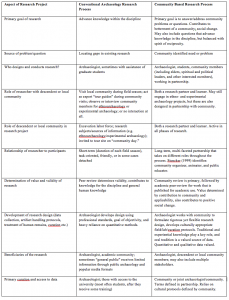by Greg Alexander
UMass Public Anthropology Course | Anthro 397D
Spring 2014
I am an undergraduate student majoring in anthropology with a concentration in archaeology. I chose this major because I find the field of archaeology to be very interesting and I want to learn as much as I can about the human past and what it could potentially teach us about our future. I decided to take the public anthropology class here at UMass because I have learned that archaeology has entanglements with colonialism and isn’t always looked upon in a positive way. Public anthropology breaks down some of these power inequalities by introducing methodologies that are more democratic and ethical. I wanted to write about Dr. Sonya Atalay’s (2012) book Community-Based Archaeology Research with, by, and for Indigenous and Local Communities because I find it very interesting and insightful for addressing the negative views surrounding archaeological research in easy to understand language.
As I looked at the comparison chart in Table 3 (partial section of the table shown to the left), she outlines the differences in the practice of community-based participatory research (CBPR) and conventional archaeology and my first thought is how much more work is involved both before and after the actual research and whether or not this can be done in a meaningful way (Atalay: 2012: 85-86). The time commitment placed upon the researcher is extensive even prior to conducting the research. Complications may arise in trying to properly define who we mean by “the community” in these community-based partnerships when multiple stakeholders are involved and limits need to be placed upon active participants in various stages of the research (Atalay: 2012: 69). Dr. Atalay’s book certainly gives the reader a lot to think about in terms of methodology and practice yet as challenging as this process may be it would be difficult to argue against CBPR being the ethical way to conduct research.
I find the most interesting aspect of CBPR to be the shift in power from the researcher to the local community in defining their own problems and ways to go about solving those problems with the expertise of the researcher (Atalay: 2012: 63). This could potentially solve many of the ethical dilemmas of anthropological research practices that are grounded in colonial methodologies, most specifically concerns about anthropologists being “objective” experts imposing their will upon a community, especially in Native American (Indigenous) communities where little benefit have been produced for those whose heritage is being studied. Atalay outlines what is truly meant by the concept “participatory” in CBPR, a term that seems to be very loosely used by some researchers. Although participation will vary by project or task, the choice for participation at any level should lie with the community (Atalay: 2012: 66-67). In my opinion, equal participation in knowledge contribution may have the effect of reducing the subjectivity of a single authority’s positionality. One person’s background has less chance of impacting the research when multiple voices and knowledge systems from alternative viewpoints are included. This multi-vocality might offset the unintentional bias in interpretation of the results and offer new insights that could elude someone unfamiliar with the context.
CBPR provides marginalized segmentsof the population a voice (and participation) in interpreting their past, dealing with current problem they face, and setting a better course for the future. One of the best ideas CBPR brings to changing social issues for the future is defined in the principle of “capacity building” (Atalay: 2012: 71). Researchers can come into a community to study a social problem and include the public but if they leave without sharing the results or building the community’s capacity to solve these problems or have a positive impact in the community, there isn’t much point in doing the research. This is where the idea of reciprocity comes into play as a major component of CBPR practices (Atalay: 2012: 74). Academic knowledge is important if it’s useful in making an impact to promote social change and social justice.
I’m curious to see what we can learn in the field of archaeology by including indigenous forms of knowledge to fill in the gaps where western forms of knowledge have come up empty. It will be very interesting to see where the direction of CBPR practices go in the future and how widely accepted it becomes in the academy. I’m grateful for the education I’ve gained here at UMass and I’m hopeful that ethical considerations will be at the forefront of my thoughts as I further my education and work in archaeology.
Works cited
Atalay, Sonya
2012 Community-Based Archaeology: Research with, by, and for Indigenous and Local Communities. California: University of California Press.

